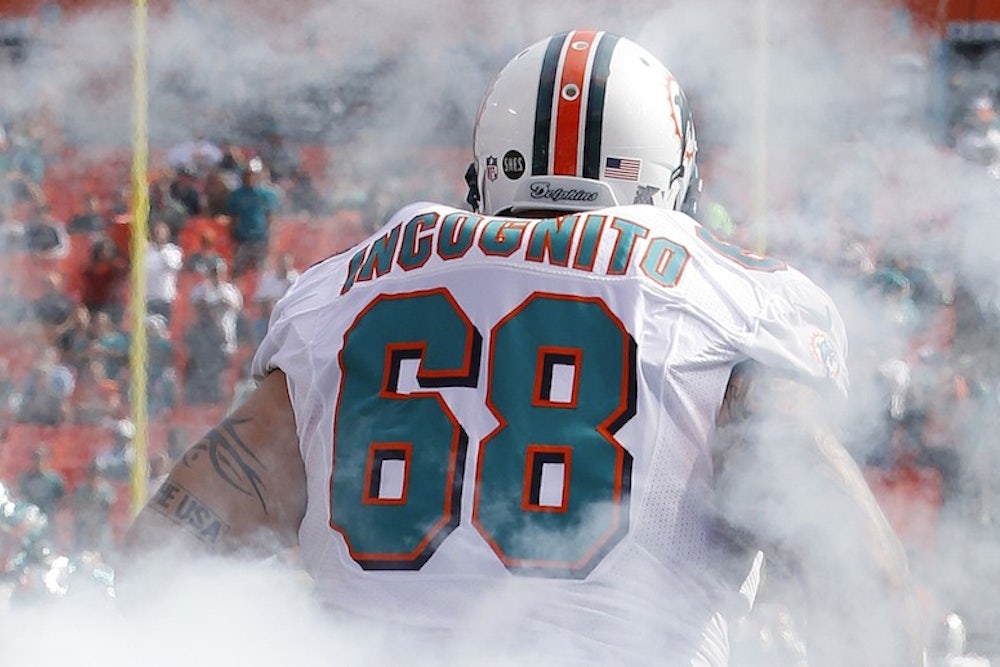The National Football League deserves kudos for commissioning an unflinching independent report into what went down in the Miami Dolphins locker room this past season. It needs all the kudos it can get: The report, published Friday, is otherwise as persuasive a brief against the NFL as could be mustered.
It investigated former offensive lineman Jonathan Martin’s allegations that his teammate Richie Incognito bullied him with racist, sexual, and generally grotesque language. Lead investigator Ted Wells found indeed that Incognito, abetted by two teammates, harassed Martin over two seasons, as well as another teammate (who was bullied for ostensibly being gay) and a trainer (the trainer is Asian-American; you can probably guess some of the disgusting things said to him). The bullying was unremitting and aimed to hurt; it caused Martin to contemplate suicide; and it was a huge factor in Martin’s decision to leave the team, and possibly the sport, midway through the season.
Slate’s Emily Bazelon, who in the past has done excellent reporting on bullying, has an essential overview. She calls for Incognito to be suspended or even expelled from the league, and for the Dolphins’ offensive line coach to be fired. She records that Martin’s mental-health issues and, at times, closeness to Incognito are precisely what made the bullies’ actions so abhorrent and effective. “As every story about him mentions, he weighs more than 300 pounds,” Bazelon writes.
How do you bring a guy like this to his knees? If you’re a team leader like Richie Incognito, it’s easy. The genius of this report is how clear that becomes as you read.
“To a great extent, Incognito dictated the culture” of the Dolphins’ locker room and offensive line, Wells and the other three members of his team write. Incognito had two abettors, his fellow offensive linemen John Jerry and Mike Pouncey. The three of them shredded Martin’s sense of self-worth in all the ways that bullies have perfected. It’s textbook. They figured out how to get to Martin, and then they kept at it, from his first season to his second last fall.
For me, the largest unanswered question is how aberrant—or not—this sort of thing is throughout the league. It is true that Incognito had been known as a particularly bad guy even before these allegations came to light last fall. But it is also true that this was just one or two seasons in just one of 32 NFL locker rooms. Former player Ross Tucker wrote that the power dynamics that Incognito exploited are omnipresent, although, in his experience, the abuse of such power dynamics is far more rare.
An especially heart-rending part of the report—which you can read in full here—is Martin’s list of the pros and cons for returning for his second season, which he originally texted to a friend. It is impossible to decouple Martin’s thinking at the time from the context of a player with mental-health issues who was being relentlessly bullied. And a few of the reasons not to return bear directly on the bullying. For instance: “I am unable to socialize with my teammates in their crude manner,” is one such reason.
But so many of Martin’s reasons not to return might well have been true even if he weren’t a bullying victim:
“I already have a lot of money. I could travel the world, get my degree. Then get a real job”
“I could lose 70 lbs and feel good about my body”
“I won’t die from CTE” [evidence of chronic traumatic encepalopathy, which is caused by repeated head trauma and can lead to dementia, has been found in the brains of several dead ex-football players]
“Maybe I’ll start to LIKE myself”
“why do I care about these people? All I need is my family.”
Even some of his ostensible reasons for returning are actually indictments of football locker-room culture:
“If I quit, I’ll be known as a quitter for the rest of my life”
“my legacy at Stanford will be tarnished”
“I will never be able to look any coach from my past in the eye.”
One thinks of ex-Denver Bronco John Moffitt, who quit midway through this past season not because of a toxic locker room or for fear of concussions, but because playing in the NFL was getting in the way of living a fulfilling life. Martin’s catalogue suggests that, whether or not the treatment he received was a stark exception, a workplace where the currency is misplaced bravado and casual cruelty is inseparable from professional football.
So kudos, again, to the NFL for publishing this report. Years from now, we may look back on it as the moment the league began to grapple with the justice of its very existence.
